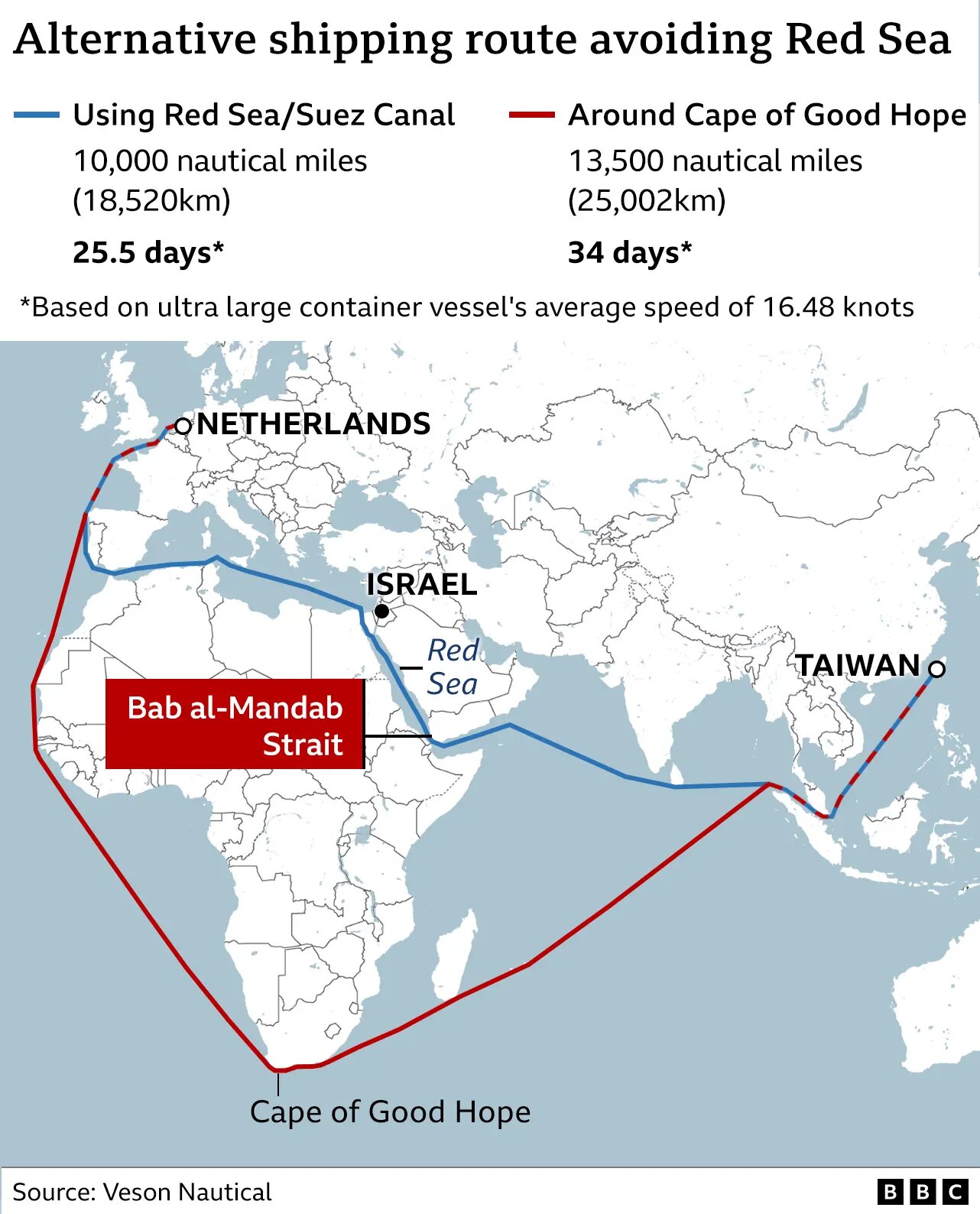Disruption to Red Sea shipping routes and prospects for maritime logistics: Impact of Israel-Hamas war and major shipping lines' response

Kay Gosho Co-founder & CTO
After graduating from the Faculty of Economics at Hitotsubashi University, he worked at a major HR company, developing search algorithms and recommendation systems using machine learning. Later, he transitioned to become a CTO at a startup before becoming a freelancer. He has provided support for system development ranging from startups to big tech companies. He founded MonCargo and serves as the CTO, overseeing all technical aspects.
On October 7, 2023, the Israel-Hamas war broke out as a result of an attack by Hamas, an Islamic militant group that controls the Gaza Strip, on Is
rael. This article aims to provide an explanation of the background of this war and the resulting disruptions in international maritime logistics.
Global Divide Caused by Israel-Hamas Conflict
The Israel-Hamas conflict has further deepened the global divide. Since Russia's invasion of Ukraine in 2022, tensions between Western countries led by the United States and Eastern countries led by China and Russia have escalated. The Israel-Hamas war has intensified this division. The international relations in the Middle East are complex, with countries like Saudi Arabia, a pro-U.S. state, and Turkey, a NATO member, as well as anti-U.S. and pro-Russia countries like Iran and Syria. However, at an emergency summit of Arab and Muslim countries on November 11, 2023, a joint statement was released warning about the war crimes committed by Israel in the Gaza Strip and the disastrous consequences it entails [^1].
Among these countries, Iran displays the most hostile stance towards Israel and the United States. Iran was a pro-U.S. country until the Iranian Revolution in 1979, which turned it into an anti-U.S. nation. Since then, Iran has been in conflict with the United States over issues such as the Iran-Iraq War and its nuclear development. The United States is a strong supporter of Israel, and in order to counter Israel and its American supporters, Iran has been providing weapons to various armed groups, including Hamas, which controls the Gaza Strip. There are arguments suggesting Iran had a cooperative relationship during the Israel-Hamas war (although Iran's UN ambassador denies this) [^2].
In this situation, the Iran-backed Islamic armed group, the Houthis, began attacking vessels passing through the Red Sea. This article will explain the impact of these attacks on international maritime logistics.
Disruption of Suez Canal Operations due to Houthi Attacks
The Houthis, an Islamic armed group formed in 1997, currently control northwestern parts of Yemen, which faces the Red Sea. They support Hamas in the Israel-Hamas war and have started attacking vessels bound for Israel via the Suez Canal and the Red Sea since December 2023. The Houthis possess a powerful military force [^3], and their military actions involving drones and missiles are well-organized and sophisticated. It is inevitable that vessel operations are disrupted when ships traveling through the Red Sea come under attack.
In response to this situation, major shipping companies have announced their decision to avoid the Red Sea and opt for the route around the Cape of Good Hope. The specific plans of each major shipping company are outlined below.
MSC
According to the official statement by MSC, on December 15 and 26, 2023, MSC container vessels came under attack while passing through the Red Sea. Although there were no injuries, the safety of the crew is the top priority, and MSC will continue to divert vessels via the Cape of Good Hope route until safety is ensured [^1].
MAERSK
According to the official statement on the MAERSK website, in response to the attack on an MSC container vessel in the Red Sea on December 15, 2023, MAERSK decided to change the route to the Cape of Good Hope. While they initially planned to resume the Red Sea route with the assistance of the multinational forces (Operation Prosperity Guardian, OPG) on December 24 and 29, due to another attack on December 30, they announced the suspension of the Red Sea route until January 2. Subsequently, on January 2, they announced that all vessels would be rerouted to the Cape of Good Hope [^2]
.
CMA CGM
According to a statement released by CMA CGM on December 26, 2023, they expressed deep concern about recent events in the Red Sea and decided to change the routes of some vessels based on Clause 10 of their maritime transport document. Some vessels, however, still passed through the Red Sea. The changed routes of these vessels can be checked on their website [^3]. ### COSCONo information could be gathered from online sources.
Hapag-Lloyd
According to the Hapag-Lloyd website, in response to an attack on their vessel "Al Jasrah" on December 15, 2023, they decided to reroute their vessels via the Cape of Good Hope based on Clause 18 of the Bill of Lading/Sea Waybill, which pertains to factors affecting performance. They will regularly reassess the situation in the Red Sea and resume services via the Suez Canal once the safety of vessels, crew, and cargo is guaranteed [^4].
Evergreen
According to the announcements on the Evergreen website on December 18 and 26, 2023, considering the escalation of the recent war situation, container ships traveling from Asia to the Mediterranean, Europe, and the U.S. East Coast will continue their voyages via the Cape of Good Hope route instead of transiting the Suez Canal due to the attacks in the Red Sea [^5].
ONE
According to a statement on the ONE website on December 20, 2023, in response to the increasing threats to the safety of vessels and crews in the Red Sea region and the Gulf of Aden, they decided to suspend the transit of their vessels through the Suez Canal and the Red Sea. As an emergency safety measure, they will temporarily switch to the Cape of Good Hope route or suspend vessel operations and move to a safe area. They will assess the situation and resume Suez Canal services when it is deemed safe [^6].
ZIM
According to their announcement on November 27, 2023, ZIM is temporarily changing the routes of some vessels to ensure the safe passage of world trade in the Arabian Sea and the Red Sea. They are taking proactive measures to protect the safety of crew, vessels, and customer cargo [^7].
Impact on Vessel Delays
The issues arising from the diversion to the Cape of Good Hope route include:
- Increase in shipping costs and logistics expenses
- Extended transportation periods due to changes in the Red Sea route
- Delays caused by schedule changes
According to BBC, using the route around the Cape of Good Hope instead of the Suez Canal increases the distance by approximately 6,500 km and leads to an average delay of 9.5 days in transit time. In practice, additional delays may occur due to the procedures for route changes and waiting for port entry. It is also important to note that the Cape of Good Hope route has historically been notorious for maritime accidents [^4].

Source: Hapag-Lloyd says Red Sea route still 'too dangerous' - BBC News
Future Outlook for Maritime Logistics
Currently, multinational forces, primarily led by the United States, have stated that they will protect vessels. They have already achieved success in shooting down Iranian drones and destroying Houthi boats attempting hijackings [^5]. However, due to the increasing international criticism of Israel's aggressive attacks, some countries are keeping their distance from multinational forces [^6]. Therefore, the extent of cooperation among Western countries remains uncertain. Although MAERSK initially announced a resumption of the Red Sea route on December 29, they quickly retracted it.
Currently, almost all major shipping companies have expressed their intention to use the Cape of Good Hope route, and simultaneously, the Panama Canal has implemented restrictions on transit due to low water levels. The disruptions in international maritime transport are not expected to be resolved soon. It is crucial to stay updated with the latest information and take appropriate measures.
References
- Shipping firms react to Houthi attacks in the Red Sea | Reuters
- 海運大手が紅海通航を見合わせ、フーシ派の攻撃活発化で-物流に影響 - Bloomberg
- ハパックロイド、紅海ルートはまだ危険過ぎる-喜望峰経由を継続へ - Bloomberg
1.
アラブとイスラム諸国の首脳ら、西側を非難 ガザの惨状めぐり - BBCニュース
2.
【解説】 ハマスとは何者か 今イスラエルを攻撃した理由は - BBCニュース
3.
Red Sea crisis: Who are the Houthis and why are they attacking ships? | CNN
4.
スエズ運河座礁で注目 「喜望峰ルート」の恐ろしさ - 日本経済新聞
5.
US Navy helicopters destroy Houthi boats in Red Sea after attempted hijack - BBC News
6.
US allies reluctant on Red Sea task force | Reuters